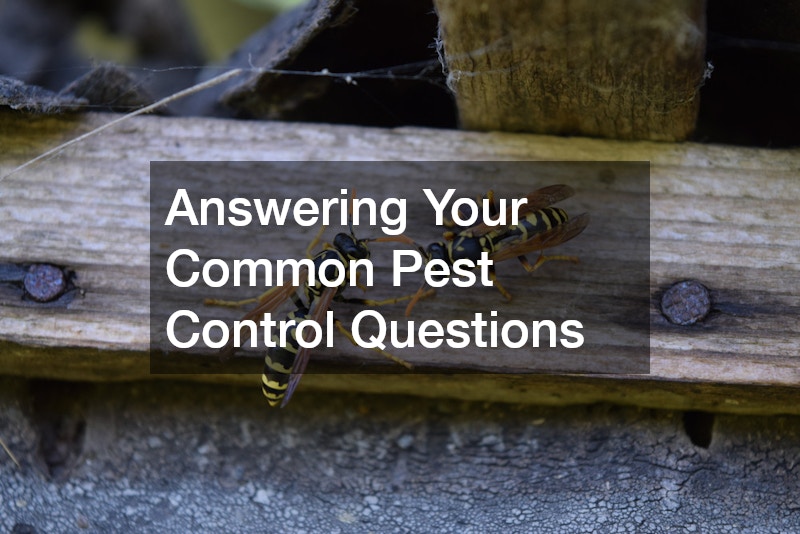Pest control is a critical aspect of maintaining a healthy and comfortable living environment. Whether you’re facing an infestation of insects, rodents, or other unwelcome creatures, an effective pest control strategy ensures that these pests don’t interfere with your daily life or pose a threat to your home and family. This article aims to address some of the most common questions people have about pest control, providing useful tips and insights into how to handle and prevent infestations. By understanding various methods, preventative steps, and when to seek professional help, you can be better equipped to tackle pest problems effectively. Additionally, it’s important to recognize how pest control relates to other areas of home maintenance, such as mold remediation service, stormwater management, and water damage restorations, which all play a significant role in creating a safe and healthy living space.
What are the most effective methods for pest control?
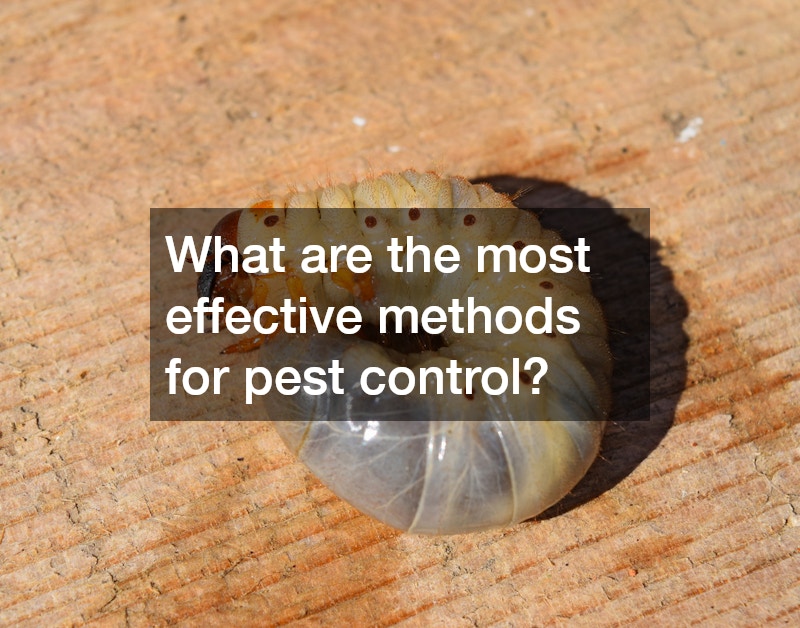
Chemical Pest Control
Chemical pest control involves the use of synthetic or natural chemicals to kill or repel pests. This method is commonly used for more severe infestations where other methods might not be as effective. Chemicals come in various forms such as sprays, baits, or traps and can target specific pests like insects or rodents. While they can offer quick results, it’s essential to consider their potential health risks and environmental impact before choosing this method. In some cases, professional intervention, such as calling a local exterminator, might be necessary to ensure proper application and avoid unnecessary exposure to harmful chemicals.
Biological Pest Control
Biological pest control focuses on using natural predators or parasites to control pest populations. For example, introducing ladybugs to combat aphids or using nematodes to kill soil-dwelling pests. This approach is often more eco-friendly and sustainable than chemical treatments. It works best for long-term management, reducing the need for pesticides. However, it can take time to see results and may not be effective for every pest problem. In cases where pests like mold or mildew have become problematic, mold remediation services might be more appropriate to handle the issue effectively without relying on chemical solutions.
Mechanical Pest Control
Mechanical pest control involves using physical devices or methods to prevent or eliminate pests. Examples include traps, fences, and barriers that prevent pests from entering or attacking your home or garden. Mechanical methods are often used in conjunction with other pest control strategies and can be a non-toxic, environmentally friendly solution. This method can be particularly useful when combined with regular home maintenance efforts, including duct cleaning and ensuring proper stormwater management to prevent conditions conducive to pest infestations. In cases of infestations in sleeping areas, knowing how to get rid of bed bugs in a mattress is critical to restore comfort and hygiene.
Integrated Pest Management
Integrated Pest Management (IPM) is an approach that combines various pest control techniques to manage pest populations in an environmentally responsible way. IPM focuses on long-term prevention through a combination of chemical, biological, cultural, and mechanical controls. The goal is to minimize risks to human health and the environment while effectively managing pest problems. In many cases, incorporating aspects of home maintenance, such as ensuring your property is properly sealed to prevent water damage, is crucial to an effective IPM strategy.
Choosing the Right Method for Your Pest Problem
The best pest control method depends on the type of pest, the severity of the infestation, and your personal preferences regarding safety and environmental impact. It’s essential to evaluate the problem carefully and select the most appropriate solution. In many cases, an integrated approach may provide the most effective and sustainable results. For example, if a water leak is contributing to the pest problem, addressing the underlying water damage through professional water damage restorations or electrical repair may be required.
How can I prevent pests from entering my home?
Sealing Entry Points
One of the most effective ways to prevent pests from entering your home is by sealing potential entry points. Check for gaps or cracks around windows, doors, and foundation walls, and ensure that screens are intact. This simple step can go a long way in keeping pests out of your home. Additionally, making sure that your roof, gutters, and foundation are properly maintained can prevent water damage, which can lead to mold growth and attract pests like termites.
Keeping a Clean Environment
Pests are often attracted to food, water, and shelter, so maintaining a clean environment is key to preventing infestations. Regularly vacuum, clean up food crumbs, and wipe down counters to ensure pests don’t have easy access to a food source. Make sure garbage cans are tightly sealed, and dispose of waste regularly. If mold or mildew is an issue, it’s also important to address these problems by seeking mildew removal or black mold removal services to prevent pests from being drawn to those environments.
Proper Food Storage
Storing food properly is essential in preventing pests like ants, cockroaches, and rodents. Keep all food in airtight containers, and avoid leaving pet food or human food out overnight. Ensure that pantry shelves are clean and that expired food items are disposed of immediately. Additionally, controlling the humidity in your home through regular duct cleaning and addressing any water damage issues can further prevent pest infestations.
Regular Home Maintenance
Routine home maintenance is crucial in keeping pests at bay. Inspect your home regularly for leaks, cracks, or areas where pests might be able to enter. Fixing leaky pipes, repairing damaged roofing, and keeping gutters clean can prevent pests from finding shelter or water inside your home. Ensuring that your stormwater management system is functioning properly will help to keep water from pooling near your foundation, which could attract pests like mosquitoes.
Using Natural Deterrents
Certain natural deterrents can help keep pests away from your home. For example, citrus peels, peppermint oil, and vinegar are known to repel common pests like ants and spiders. Using natural repellents can be a safe and eco-friendly way to deter pests without the need for harmful chemicals. For more persistent infestations, you may need to consult a local exterminator to address the issue effectively. For more persistent infestations, bed bug inspections may be necessary to ensure early detection and effective treatment.
What are the signs of a pest infestation?
Unusual Odors
One of the first signs that you may have a pest infestation is a strange or musty odor. This could be the smell of pests such as rodents or insects, or it could be the result of mold or mildew caused by a pest infestation. If you notice an unusual odor in your home, it’s important to investigate further. If the odor persists, it may be necessary to contact a professional mold remediation service to address potential mold or mildew problems, which can also contribute to pest issues.
Evidence of Nesting
Many pests, such as rodents and insects, build nests to establish their presence in your home. You may notice signs of nesting, such as shredded materials, hollowed-out areas, or small holes in walls or furniture. If you find these signs, it may indicate that pests are making themselves at home in your space. At this point, it may be time to consider professional pest control or mold remediation services to remove the infestation and prevent further damage.
Pest Droppings
Pest droppings are another clear sign of an infestation. Whether it’s mouse droppings in your pantry or cockroach feces in your kitchen, droppings are often one of the easiest ways to identify the presence of pests. Be sure to clean up droppings carefully, as they can carry diseases and allergens. If the infestation is significant, consulting a local exterminator will be necessary to address the problem and eliminate any health risks.
Damaged Plants or Wood
Some pests, particularly termites, carpenter ants, and certain beetles, cause damage to wood and plants. If you notice unexplained holes in your wooden furniture, beams, or plants, it’s essential to inspect the area closely for signs of pest activity. Early detection can help prevent significant damage to your property. If structural damage from pests like termites is severe, you may also need to address water damage and stormwater management issues to prevent further damage to your home.
Odd Sounds at Night
Certain pests, especially rodents like rats and mice, are more active at night. If you hear scratching, scurrying, or gnawing noises coming from within your walls or attic during the night, it could be a sign of a pest infestation. These sounds indicate that pests are moving around or attempting to find food or shelter. If you suspect an infestation, it’s advisable to call a local exterminator for proper inspection and removal.
When should I call a pest control professional?
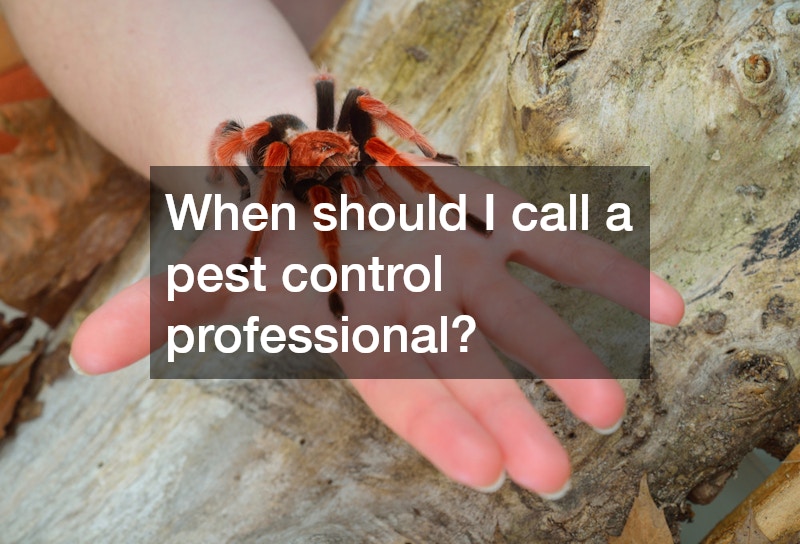
Severity of Infestation
If you notice that the pest problem is beyond what you can handle, it may be time to call in a professional. Severe infestations, such as a large number of rodents or widespread insect activity, often require professional treatment to eliminate the pests and prevent further damage. Additionally, if your pest problem is accompanied by mold, mildew, or water damage, contacting a professional mold remediation service or pest control specialist is essential for addressing the root cause.
DIY Methods Have Failed
If you’ve tried DIY pest control methods and haven’t had success, it may be time to consult a pest control expert. Professionals have access to more advanced tools and treatments that can address the problem more effectively than common household methods. In some cases, DIY methods can exacerbate issues, particularly when water damage, mold, or structural problems are involved.
Health Concerns
Certain pests, such as mosquitoes and rodents, can transmit diseases. If you’re concerned about the potential health risks posed by pests, it’s important to seek professional help. A pest control expert can address the issue and reduce the risks to your health and the health of your family. Additionally, if mold has developed as a result of water damage, it is important to have black mold removal services performed to avoid serious health risks.
Frequency of Infestations
If you find that pests are returning frequently, despite your best efforts to prevent them, this is a sign that you may need professional help. Recurrent infestations can indicate that there is a deeper issue that needs to be addressed, such as structural problems, water damage, or persistent attractants. Professionals can also help address stormwater management issues that might be contributing to pest problems.
Identifying Pest Types
If you’re unsure of the type of pest causing the problem, a professional pest control technician can help identify the pest and recommend the most appropriate treatment. Identifying the pest correctly is crucial for choosing the right approach to elimination. In some cases, mold and mildew infestations could be misdiagnosed as a pest problem, so it’s important to consult the right experts for accurate identification.
Are pest control chemicals safe for my family and pets?
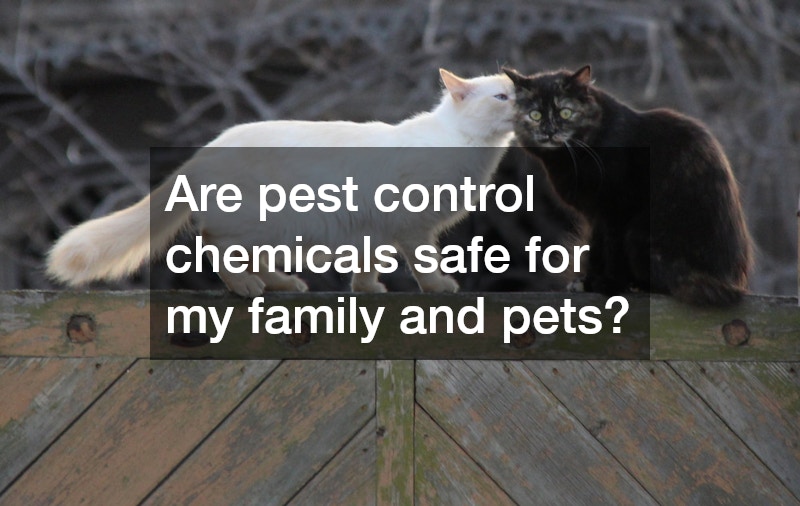
Understanding Product Labels
Before using any pest control chemicals, it’s important to read and understand the product label. This will provide information on safe usage, potential risks, and how long to wait before re-entering treated areas. Following the instructions carefully will minimize health risks to your family and pets. If you’re concerned about chemical exposure, alternative methods, such as seeking a mold remediation service or using natural deterrents, may be preferred.
Safe Application Procedures
When applying chemical pest control products, ensure that they are applied in a safe and controlled manner. Follow the recommended guidelines for application, and avoid applying chemicals in areas where children or pets play. It’s also essential to ensure proper ventilation during application. In cases where water damage is involved, and mold has developed, professional mold remediation service providers may offer safer, non-chemical solutions.
Risks of Overexposure
Overexposure to pest control chemicals can pose serious health risks. Be aware of the potential symptoms of poisoning or allergic reactions, such as dizziness, nausea, or skin irritation. If you suspect overexposure, seek medical attention immediately. If mold or mildew issues are present alongside a pest problem, the presence of mold spores can also exacerbate health issues, making professional black mold removal a safer option.
Alternative Eco-Friendly Solutions
If you’re concerned about the risks associated with chemical pest control, consider using eco-friendly alternatives. Many natural pest control products, such as essential oils, diatomaceous earth, or plant-based sprays, can be just as effective without the potential risks to your family or pets. These solutions can also help prevent water damage and mold, both of which can lead to pest issues if left untreated.
Post-Treatment Safety Measures
After pest control treatments are applied, it’s important to take safety precautions to minimize exposure. Follow the recommended re-entry times and keep pets and children away from treated areas until it’s safe to return. If pest control services are coupled with water damage restorations, be sure to address any structural repairs promptly to prevent further infestations.
How often should pest control treatments be done?
Factors Affecting Frequency
The frequency of pest control treatments depends on several factors, including the type of pest, the severity of the infestation, and the size of your property. For example, some pests may require more frequent treatments than others. It’s essential to assess the situation and develop a treatment plan that works best for your needs. If water damage or mold growth is involved, more frequent treatments may be necessary to prevent further pest attraction.
Seasonal Treatment Plans
Certain pests are more active during specific seasons. For instance, ants and termites may be more prevalent in warmer months, while rodents may seek shelter in colder weather. Seasonal pest control treatments can help prevent infestations during peak activity periods. Additionally, addressing mold, mildew, and stormwater management issues during seasonal transitions can help reduce pest risks.
Type of Pests Present
The type of pest present in your home will influence the frequency of treatments. Some pests, such as cockroaches, may require ongoing treatment to manage, while others, like seasonal pests, may only need occasional treatment. If there are ongoing issues with water damage or mold, it is advisable to incorporate regular mold remediation service or water damage restorations into your pest control plan.
Benefits of Regular Maintenance
Regular pest control maintenance can help prevent recurring infestations and minimize the need for more aggressive treatments. A proactive approach ensures that pests are dealt with early, reducing the risk of significant damage to your home. Regular duct cleaning, water damage restorations, and stormwater management are essential components of a long-term maintenance plan.
Signs That Indicate Immediate Need
If you notice signs of pest activity, such as droppings, damage, or unusual odors, it may indicate that immediate pest control is needed. Delaying treatment can lead to more extensive problems that are harder and more costly to address. Additionally, if mold growth or water damage is present, these issues must be addressed immediately to prevent further damage to your property.
What are some natural pest control alternatives?
Essential Oils
Essential oils like peppermint, lavender, and eucalyptus are known to repel common pests like ants, spiders, and mosquitoes. By mixing these oils with water and spraying them around your home, you can create a natural and chemical-free deterrent for pests. These oils can also have a positive effect on your home’s indoor air quality, preventing the growth of mold and mildew, which can attract pests.
Diatomaceous Earth
Diatomaceous earth is a fine powder made from the fossilized remains of algae. It’s a non-toxic substance that can be used to kill pests like ants, bedbugs, and fleas. When pests come into contact with diatomaceous earth, it damages their exoskeletons, leading to dehydration and death. This powder can also help prevent mold growth in areas of high moisture, addressing both pest and mold issues simultaneously.
Homemade Pest Sprays
Homemade pest sprays, made from natural ingredients like vinegar, garlic, or citrus, can be an effective way to deter pests without using harmful chemicals. These sprays can be used in areas like the kitchen, garden, or entry points. In addition, they can help control the conditions that lead to mold growth and mildew, which in turn attracts pests.
Natural Predators
Introducing natural predators to your garden or home can help control pest populations. For example, ladybugs can be used to control aphid infestations, while nematodes can kill soil-dwelling pests. This approach can help maintain a balance in your ecosystem and prevent the need for chemical pesticides.
Preventative Measures
Maintaining a clean and dry environment is one of the most effective natural pest control methods. Proper stormwater management, regular duct cleaning, and fixing any leaks that cause water damage are essential to prevent pests from being attracted to your home. Additionally, regular inspections can help identify pest problems early, preventing larger infestations in the future.
How can I choose a reliable pest control service?
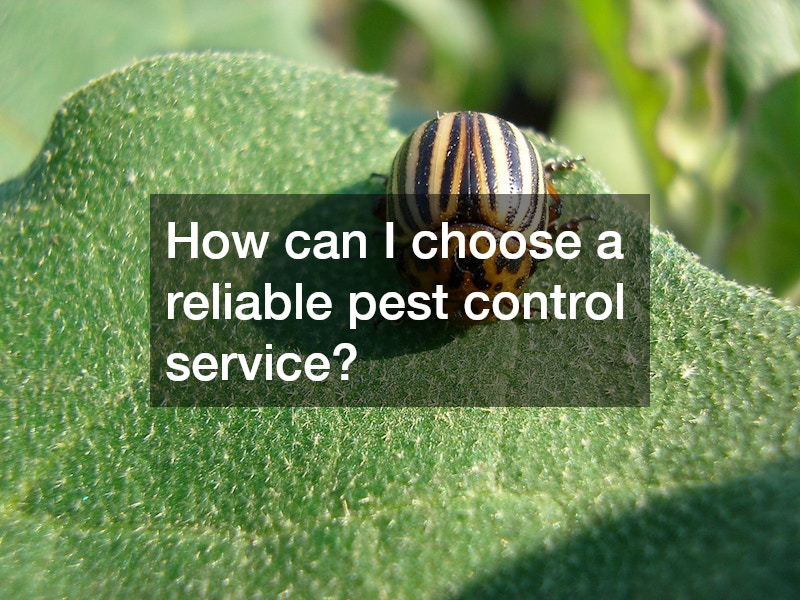
Checking Credentials and Certifications
When selecting a pest control service, it’s crucial to verify that the company is properly licensed and certified. Certification ensures that the pest control company adheres to industry standards and best practices. This can provide peace of mind knowing that the company has the proper training and experience to handle pest problems safely and effectively. Whether dealing with rodents, termites, or mold issues, a reputable company should have up-to-date certifications for the treatments they provide.
Reading Customer Reviews
Before committing to a pest control service, take the time to read customer reviews and testimonials. Feedback from past clients can give you valuable insight into the quality of service, effectiveness, and professionalism of the company. A trusted pest control service will have a solid reputation, and positive reviews can help you feel confident that you are choosing a company that will provide reliable service and results.
Service Guarantees and Warranties
A reliable pest control service should offer some form of guarantee or warranty for their work. This ensures that if pests return after treatment, they will address the issue at no additional cost. A good warranty reflects the company’s commitment to customer satisfaction and the effectiveness of their pest control methods. If the service includes mold or water damage restoration, ask about warranties for those services as well, as these are often essential in preventing further damage.
Cost Considerations
While cost shouldn’t be the only factor in choosing a pest control service, it’s important to find a company that offers competitive pricing and transparent billing. Be sure to request an estimate upfront and inquire about any additional fees or charges. Keep in mind that the cheapest service isn’t always the best option, as you may be compromising on quality. For comprehensive pest control, including water damage restorations or black mold removal, a higher-quality service might be more cost-effective in the long run.
Evaluating Customer Service
Customer service plays a significant role in selecting a reliable pest control service. Ensure that the company’s representatives are responsive, knowledgeable, and willing to answer any questions you may have. Good communication is essential, especially if your pest problem is urgent or involves additional services like duct cleaning, electrical repair, or mold remediation. A company that offers excellent customer service is likely to be more committed to resolving your pest issues and providing a positive experience.
Conclusion
In conclusion, pest control is a multifaceted issue that requires careful consideration of the best methods and strategies to protect your home and family. Whether you choose chemical treatments, biological pest control, or Integrated Pest Management (IPM), it’s crucial to select the right approach for your specific needs. Preventative measures, such as sealing entry points, keeping your home clean, and addressing water damage, can go a long way in keeping pests at bay. Additionally, regular maintenance and proper seasonal adjustments can help you stay ahead of potential infestations.
If you notice signs of an infestation, such as unusual odors, damaged wood, or pest droppings, it’s important to act quickly to prevent the problem from worsening. In some cases, professional help may be necessary, especially if the infestation is severe or if health concerns are involved. Reliable pest control services will have the expertise to handle your problem effectively and safely, and they may also assist with related issues like mold removal, water damage restorations, and stormwater management.
By understanding your options and staying proactive in your approach to pest control, you can create a healthy, pest-free environment for you and your family. Remember, the key to long-term success is not only choosing the right pest control method but also maintaining a clean and well-maintained home. By combining preventive care with professional expertise when needed, you can safeguard your property against unwanted pests while protecting your home from potential damage caused by mold, water, and other environmental factors. mildew removal mildew removal
